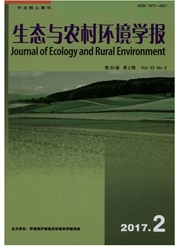

 中文摘要:
中文摘要:
通过室内恒温培养试验,研究施用CO(NH2)2和(NH4)2SO4对初始pH值分别为5.14、4.77和4.34的红壤酸化速率和硝化速率的影响。结果表明,施用CO(NH2)2显著增加了3种红壤的硝化速率,从而显著加速土壤酸化。培养结束时,3种红壤pH值较培养过程中最高值分别下降2.14、1.23和0.56。施用(NH4)2SO4抑制了初始pH〈5.0的2种红壤的硝化作用,从而显著降低这2种红壤的硝化速率和酸化速率,但显著增加了初始pH〉5.0红壤的硝化速率,对其酸化速率则未见显著影响。3种红壤的酸化速率与硝化速率间存在显著线性相关关系。硝化作用是导致农田红壤pH值下降的主要原因之一,但不同氮肥对红壤硝化速率和酸化速率的影响不同。
 英文摘要:
英文摘要:
Effects of application of urea and(NH4)2SO4 on nitrification in and acidification of red soils different in initial pH(5.14,4.77 and 4.34) were studied through incubation experiments.It was found that application of urea accelerated nitrification in and thereby acidification of the three soils,and that at the end of the incubation,soil pH decreased by 2.14,1.23 and 0.56 units,separately,in the three soils relative to their respective maximum pHs observed during the incubation.Application of(NH4)2SO4 also accelerated nitrification in the soil high in initial pH(〉5.0),but it had no significant effect on acidification of the soil.However,nitrification in and acidification of the two soils low in initial pH(〈5.0) were inhibited by the application of(NH4)2SO4.Soil acidification rates were found to be linearly correlated with nitrification rates in the three soils.These findings suggest that nitrification of NH+4-N in the soil is one of the main factors responsible for the acidification of the red soil of crop fields,but urea and(NH4)2SO4 showed different effects on nitrification in and acidification of these red soils.
 同期刊论文项目
同期刊论文项目
 同项目期刊论文
同项目期刊论文
 Coordination nature of aluminum (oxy)hydroxides formed under the influence of low molecular weight o
Coordination nature of aluminum (oxy)hydroxides formed under the influence of low molecular weight o Effects of Amorphous Al(OH)(3) on the Desorption of Ca2+, Mg2+, and Na+ from Soils and Minerals As R
Effects of Amorphous Al(OH)(3) on the Desorption of Ca2+, Mg2+, and Na+ from Soils and Minerals As R 期刊信息
期刊信息
